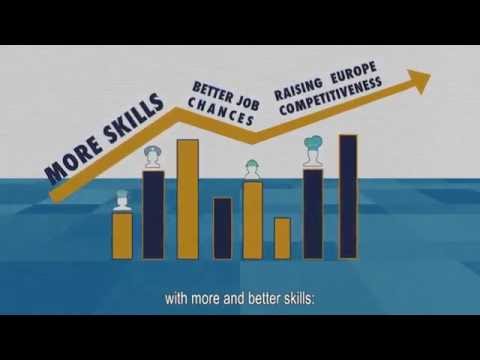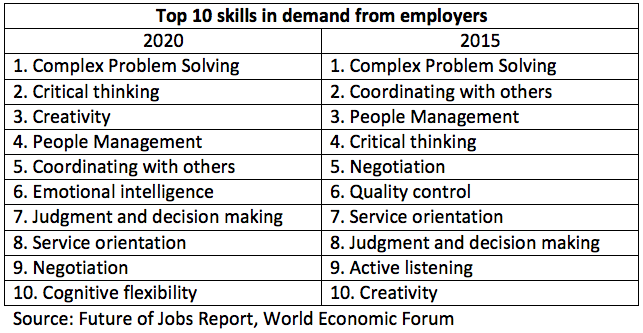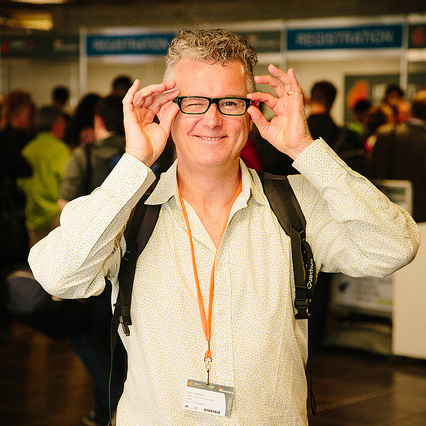Open for business? Europe’s cities and the skills challenge of the Next Economy
Edited on
06 December 2016
Read time: 6 minutes
Eight years after the advent of the Global Financial Crisis, much of Europe's economy continues to be sluggish, with uneven rates of jobs and business growth across the EU. There are, of course, bright spots on the map, but overall the picture remains disappointing.
As ever, the coming battle focuses on cities, where most businesses and jobs are concentrated. In those economies that remain weak, it is our cities which display the highest rates of joblessness. Equally, it is in our dynamic urban areas where hopes for business and jobs growth are highest.
The EU has consistently identified the key role cities occupy in relation to the skills and jobs agenda. A long history of macro policy statements and policy directives confirms this. The most recent of these is the launch of the Jobs and Skills Partnership within the Urban Agenda for the European Union. Another is the New Skills Agenda for Europe, which proposes a 10 point plan to boost EU citizens’ skills, particularly at the basic level.
But what does this mean in practice? This article will explore the challenges and opportunities facing cities in relation to the jobs and skills agenda. It will pay particular attention to assumptions about future growth – itself increasingly challenged as a beneficial concept. In doing so the article will touch upon the concept of the Next Economy, and what Jeremy Rifkin has described as the Third Industrial Revolution (TIR). Under this scenario, we will need a radical rethink of the way we prepare citizens for what is ahead.
We will explore what the Jobs and Skills Partnership can do to support cities' adjustment to this anticipated step change in the economy. Finally, the article will reflect on the leading work of cities in this area, as well as considering the contribution that the URBACT Programme can make.

The Next Economy and the New Skills Agenda for Europe
As ever, there is good news and bad news. The good news – according to Rifkin and others - is that the convergence of Internet technology and renewable energy has the potential to transform the economic model which has been prevalent for over 100 years. This shift encompasses the transition from fossil to renewable fuels, transforming buildings into generators of clean fuel, with dramatic drops in energy charges. Importantly, it also includes the potential of the Internet of Things to enable all devices to communicate with one another.
Together these have enormous potential for transformative change, for example in the logistics and mobility sectors. The establishment of a new energy regime provides the framework for this revolution. In this, energy is loaded by buildings, partially stored in the form of hydrogen, distributed via a green electricity Internet, and connected to a plug-in, zero-emission transport network. Households are morphed into energy producers with earning potential through feed-in tariffs. Citizens are new prosumers of energy. The prospects is breathtaking – and potentially gamechanging.
Alongside this, Rifkin and others have identified the growth of the Commons movement as the social lubricant for this new economic paradigm. Facilitated by the Internet and by the principles of the open source movement (and harking back to pre-capitalist transactional models) the Commons structure has been reimagined. Digital and social media tools are helping reshape collaboration models and catalyzing the shift towards horizontal networks. The social economy, for so long a Cinderella sector, may finally be coming of age, particularly as Millenials prioritise quality of life issues over financial rewards.
So far so good. However, in some parts of Europe these elaborate descriptions may read like science fiction. In fact, even in our most advanced cities, significant proportions of our citizens remain unprepared for what is ahead – and what is actually happening now. That goes for our education systems, which have struggled to adapt since the onset of the Internet and the unleashing of the digital economy. Our children can acquire more knowledge on their tablets for one hour than they can do in a routine school day.
At the other end of the demographic scale we have growing numbers of older people within our labour market. On the plus side this is driven by improved health levels. On the down side, inadequate pensions mean older people have no choice but to work longer. Alongside this, we have new arrivals coming to Europe’s cities looking for a future. Arriving with hope, energy and resilience, the challenge is to find ways of enabling them to make an active contribution to our economies.
In a nutshell, this is what we face. On the one hand, an exciting new age of opportunity. On the other, the reality of a Europe where significant proportions of citizens have such low skills that their future prospects are curtailed. According to the EU’s latest data, 1 in 5 adults have low literacy levels, almost 1 in 4 low numeracy levels and 2 in 5 (41%) have no basic digital skills. At the same time, this data indicates that 2 out of every 5 employers have difficulties finding staff with the right skills.

So the challenge is clear: how can we transform the way we educate and train our people so that Europe can harness the potential of these exciting opportunities?
How are Europe's cities responding?
In late September, under the auspices of Eurocities, the City of Rotterdam hosted an event to examine this question in detail. As well as the host city, Ghent, Vienna, Munich, Malmo, Nantes and Birmingham played an active part in the frank and detailed debate that took place. They were joined by other key voices with a keen interest in future employment developments including the European Commission (DG Employment, Social Affairs and Inclusion), the OECD and private sector players such as the Randstad Group.
A number of common themes ran through the city inputs and the ensuing debate. The overarching one was the need to better reconcile the education and skills supply chain with the dramatically shifting needs of our advanced economies. Evidence presented by the OECD and Randstad illustrated the mismatch and the growing challenge ahead. Contributors from Rotterdam and the Hague Metropolitan Region cited evidence from The World Economic Forum’s (WEF) research into future skills needs. This indicates that ‘Complex Problem Solving’ ‘Critical Thinking’ and ‘Creativity’ will be the top three competencies required in 2020. As the table below shows, ‘Creativity’ will be the biggest changer from now.

This clearly has fundamental implications for the education sector, which are being addressed with varying degrees of success. An upstream focus on curricular modernization is required if our children are to acquire the competencies they will need in future. For example, this will include a stronger emphasis on key attitudes such and entrepreneurialism, creativity and emotional intelligence, as the Next Economy model unfolds.
This challenge also translates into the realm of governance. How do cities ensure that their learning systems align and adapt effectively? The Rotterdam team explained how at city level they are responding to this through their Next Education Group approach. This has created three realms (education providers, social economy/innovation bodies and the business sector) to engage key players in the co-design of new working models and structures.
The nearby city of Ghent is also proactively tackling these issues. It has recently undertaken work exploring talent issues for the city’s future economy. Engagement with eminent Human Resources professionals in the city confirmed the anticipated decline of low-skilled opportunities through automation and innovation. It reveled the need for a sophisticated partnership model in the city, using foresight tools and shared intelligence to anticipate skills requirements. Key components of the approach include collaboration with businesses to strengthen flexibility and resilience; smart specialization, particularly with regard to the circular and social economies; and support for the local maker economy.

As well as looking at future skills supply, there is a wider discussion about the skills levels of adults already in the labour market. This is evidenced in the EU data highlighting the basic skills challenges. In a world where portfolio careers are the norm, citizens will routinely have to manage transitions and will constantly have to upskill. Lifelong learning, so often a cliché, must become the standard if all Europeans are to keep pace with the changing world of work.
This need for upskilling relates to all industry sectors, and to all professional levels. The Next Economy means changes across the board, already evident in the impact of automation and technological change. The controversial growth of the Gig Economy, led by businesses like Uber and Airbnb is already transforming the mobility and hospitality sectors. Even in traditionally safer sectors like Health, Education, Finance and Legal Services, technological changes are shaking jobs out at all levels.
 Yet, new opportunities are being created. At the same time, there is growing demand in certain sectors and for services which cannot be offshored or entirely replaced by technology. In an ageing European society, for example, there are growing opportunities in the care sector. For example, the EU Skills Panorama forecasts the creation of over 104 million job openings will be created in the Health and Care sector between 2013 and 2025. Many of these are in the growing homecare sector, supporting older people to live independently in later life.
Yet, new opportunities are being created. At the same time, there is growing demand in certain sectors and for services which cannot be offshored or entirely replaced by technology. In an ageing European society, for example, there are growing opportunities in the care sector. For example, the EU Skills Panorama forecasts the creation of over 104 million job openings will be created in the Health and Care sector between 2013 and 2025. Many of these are in the growing homecare sector, supporting older people to live independently in later life. European cities will therefore continue to offer opportunities at all skill levels. This is an important component of the equity agenda, which recognizes the importance of creating pathways to paid employment to tackle the risk of widening inequalities in our cities. Rotterdam’s Mayor Aboutaleb shared a powerful insight into this challenge. He took, as an example, a Somali woman who has travelled from her troubled country with two young children, navigating huge challenges en route via the Middle East and Turkey. Arriving in the Netherlands she can be told that she has no relevant skills and can be considered to a life on welfare, despite the evident resilience and problem solving skills she has demonstrated in getting there. He argued that our cities must be in the vanguard of improving this transition experience for third country nationals, if we are to optimise the talent potential they bring.
How can the EU Urban Agenda Jobs and Skills Partnership contribute?
Mayor Aboutaleb’s example underlined the important role cities play in Europe’s New Skills Agenda. Earlier this year, the Eurocities’ response to the Commission’s 10-point plan, reinforced this. Around specific points – such as the Skills Guarantee and the Skills Profile Tool for Third Country Nationals, the potential role of urban authorities is clear. It is in our metropolitan areas where the majority of third country nationals live, where the skills challenge is most pronounced and where the reservoir of advanced expertise is also located.
It is unthinkable to contemplate the New Skills Agenda rolling out without an active and influential role for Europe’s leading cities. The same is true of the recently announced Jobs and Skills Partnership within the Urban Agenda for Europe. As with the other partnerships already in place these must build on an already significant body of evidence. To be effective, they should focus on support for new and innovative ways of working, Europe’s cities needs tangible examples of how these new challenges can be tackled, rather than additional analysis on the scale and nature of the problem.
It is encouraging that Rotterdam is at the table, particularly as its recently approved Urban Innovative Actions project addresses these very issues. Several URBACT cities are also likely to make an active contribution.
URBACT'S contribution to the debate
Alongside this, the URBACT programme has a potentially important role to play. It has already generated important evidence relating to the questions of governance, skills and jobs. Its initial Workstream report on social innovation, cities and youth employment explored the evolving role of city authorities. Following this, the Jobs Generation for a Jobless Generation Workstream identified the available levers at city level for shaping the jobs and skills agenda. In the same series, the programme generated important future insights through its new urban economies Workstream. Each of these outputs drew heavily on URBACT’s mobilization of city networks across Europe, which provide a vital platform for exchange, learning and capacity building.
Within the URBACT II Programme, projects like My Generation, My Generation at Work, EUniversities and ESIMEC generated important lessons around this policy theme. That work continues in the URBACT III Programme where a new generation of networks has picked up this baton. They include Resilient Europe, led by Rotterdam, TechTown, led by Barnsley and Gen Y City led by Poznan.
Consequently, URBACT provides a real time link between the high level debate on Next Economy, Jobs and Skills, and the day-to-day reality of designing solutions and testing new ways of working. Later this year, the programme’s call for good practice examples will provide an additional sphere of intelligence, again with a practical focus as URBACT launches its new wave of transfer networks. Complementing this will be URBACT’s ongoing capacity building work, ensuring that urban stakeholders have the knowledge and skills required to maximize the opportunities arising.
Moving forward, together with other key platforms – including Eurocities and the Urban Innovative Actions programme – URBACT can try to ensure that the new Jobs and Skills Partnership is rooted in practice, focused on cities’ needs and focused on the big challenges ahead.
Themes homepage sticky:
 Submitted by Eddy Adams on
Submitted by Eddy Adams on
